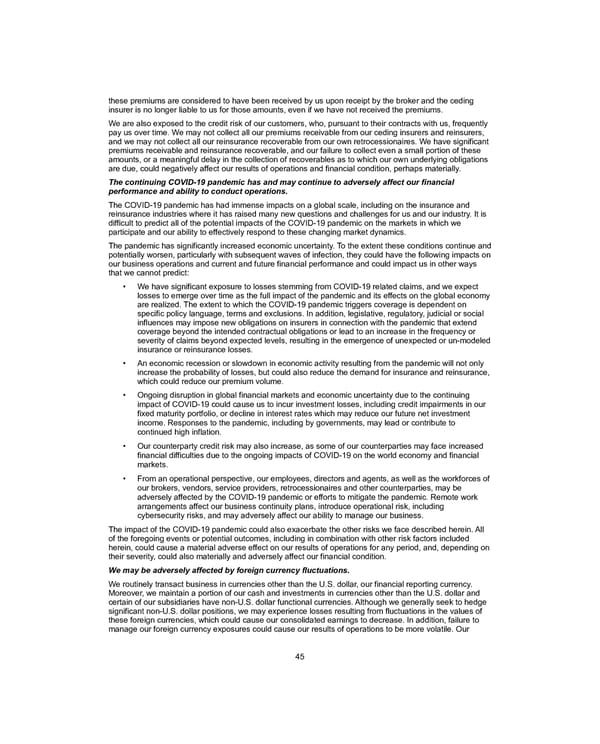these premiums are considered to have been received by us upon receipt by the broker and the ceding insurer is no longer liable to us for those amounts, even if we have not received the premiums. We are also exposed to the credit risk of our customers, who, pursuant to their contracts with us, frequently pay us over time. We may not collect all our premiums receivable from our ceding insurers and reinsurers, and we may not collect all our reinsurance recoverable from our own retrocessionaires. We have significant premiums receivable and reinsurance recoverable, and our failure to collect even a small portion of these amounts, or a meaningful delay in the collection of recoverables as to which our own underlying obligations are due, could negatively affect our results of operations and financial condition, perhaps materially. The continuing COVID-19 pandemic has and may continue to adversely affect our financial performance and ability to conduct operations. The COVID-19 pandemic has had immense impacts on a global scale, including on the insurance and reinsurance industries where it has raised many new questions and challenges for us and our industry. It is difficult to predict all of the potential impacts of the COVID-19 pandemic on the markets in which we participate and our ability to effectively respond to these changing market dynamics. The pandemic has significantly increased economic uncertainty. To the extent these conditions continue and potentially worsen, particularly with subsequent waves of infection, they could have the following impacts on our business operations and current and future financial performance and could impact us in other ways that we cannot predict: • We have significant exposure to losses stemming from COVID-19 related claims, and we expect losses to emerge over time as the full impact of the pandemic and its effects on the global economy are realized. The extent to which the COVID-19 pandemic triggers coverage is dependent on specific policy language, terms and exclusions. In addition, legislative, regulatory, judicial or social influences may impose new obligations on insurers in connection with the pandemic that extend coverage beyond the intended contractual obligations or lead to an increase in the frequency or severity of claims beyond expected levels, resulting in the emergence of unexpected or un-modeled insurance or reinsurance losses. • An economic recession or slowdown in economic activity resulting from the pandemic will not only increase the probability of losses, but could also reduce the demand for insurance and reinsurance, which could reduce our premium volume. • Ongoing disruption in global financial markets and economic uncertainty due to the continuing impact of COVID-19 could cause us to incur investment losses, including credit impairments in our fixed maturity portfolio, or decline in interest rates which may reduce our future net investment income. Responses to the pandemic, including by governments, may lead or contribute to continued high inflation. • Our counterparty credit risk may also increase, as some of our counterparties may face increased financial difficulties due to the ongoing impacts of COVID-19 on the world economy and financial markets. • From an operational perspective, our employees, directors and agents, as well as the workforces of our brokers, vendors, service providers, retrocessionaires and other counterparties, may be adversely affected by the COVID-19 pandemic or efforts to mitigate the pandemic. Remote work arrangements affect our business continuity plans, introduce operational risk, including cybersecurity risks, and may adversely affect our ability to manage our business. The impact of the COVID-19 pandemic could also exacerbate the other risks we face described herein. All of the foregoing events or potential outcomes, including in combination with other risk factors included herein, could cause a material adverse effect on our results of operations for any period, and, depending on their severity, could also materially and adversely affect our financial condition. We may be adversely affected by foreign currency fluctuations. We routinely transact business in currencies other than the U.S. dollar, our financial reporting currency. Moreover, we maintain a portion of our cash and investments in currencies other than the U.S. dollar and certain of our subsidiaries have non-U.S. dollar functional currencies. Although we generally seek to hedge significant non-U.S. dollar positions, we may experience losses resulting from fluctuations in the values of these foreign currencies, which could cause our consolidated earnings to decrease. In addition, failure to manage our foreign currency exposures could cause our results of operations to be more volatile. Our 45
 2021 Annual Report Page 60 Page 62
2021 Annual Report Page 60 Page 62